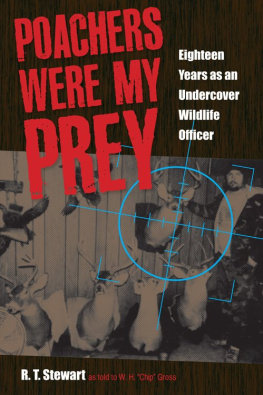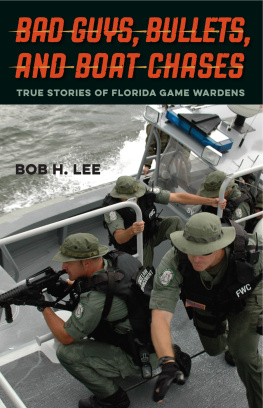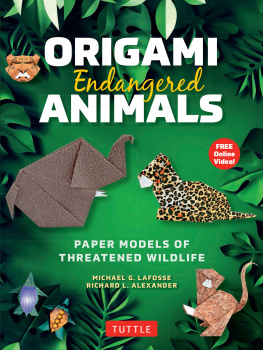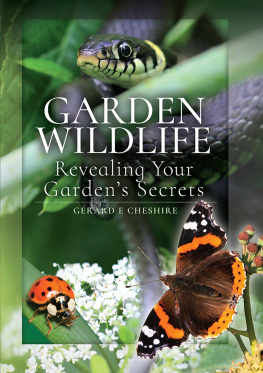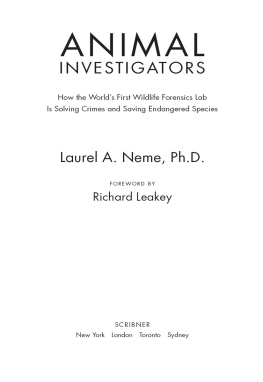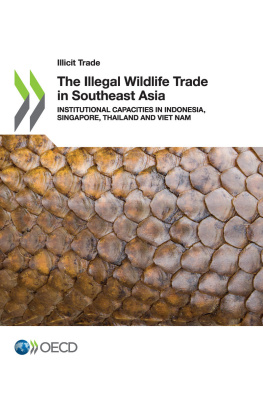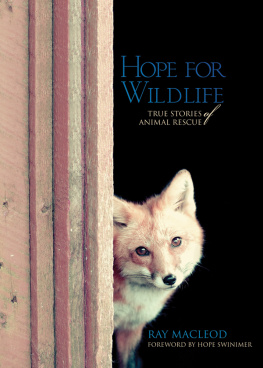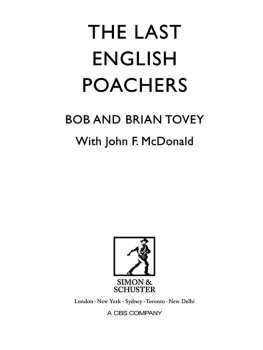R. T. STEWART
As told to W. H. Chip Gross
In certain cases, names of individuals have been changed for purposes of confidentiality.
Frisky, industrious black squirrels are a familiar sight on the Kent State University campus and the inspiration for Black Squirrel Books, a trade imprint of The Kent State University Press
www.KentStateUniversityPress.com
Cataloging information for this title is available at the Library of Congress.
during my undercover career.
Kevin ODell, Supervisor (retired), Covert Wildlife Law Enforcement Unit,
Division of Wildlife, Ohio Department of Natural Resources
Why was R. T. Stewart such an exceptional undercover wildlife law enforcement officer? What made him so good at what he did? As R.T.s supervisor for several years, I speak from experience when I say that he was a true chameleon, someone who could blend in with almost any group of people in any situation. He could walk the walk and talk the talk of a hard-core poacher, and throughout his long career, even if the bad guys suspected him of being someone other than he seemed, which several poachers did, none of them ever managed to break his cover or unveil his true identity as an officer.
Stewart had a talent for connecting and communicating with people. While he wasnt particularly gifted at putting words on paperI know, as I had to read his many investigation reportshe was amazingly good at communicating face to face. If he could talk directly to someone, he could read that person instantly and charm him into a real liking for him in a matter of minutes. He often told me how poachers would tell him things about their lives they had rarely told anyone else, and would make these confidences just a few days after meeting him.
Stewart understood how people work. He realized early in his career that people liked to be praised. If he could convince people that he admired themif he could put a person on a pedestal, at least in his or her mindit stroked that persons ego. Stewart was often able to use this quirk of human nature to his advantage. He also learned never to compete with poachers. He always wanted them thinking they were better than he was at most everything, although that was seldom the case.
Stewart himself wondered, at times, why he was able to do the things he did so easily and proficiently. I believe his success was partly a result of his life experiences and partly a result of the natural gifts he was born with. Stewart grew up relatively poor and had a range of experiences before being hired by the Division of Wildlife. He worked in coal mines, took part in strikes, suffered through periods of unemployment, and witnessed the illegal use of drugs and alcohol. He also earned a college degree and taught college for several years. In short, before becoming a wildlife officer in Ohio at the age of thirty-five, hed done it all and in the process had met and interacted with many different kinds of people. And all the while, either consciously or subconsciously, he was learning what made people tick, especially poachers. This meant he brought to the job a level of maturity lacking in many younger officers.
Stewart is also a man of common sense, something that seems in short supply these days. This he combined with his street sense and woods sense. Hes also self-reliant. If something breaks, he can fix it or knows how to improvise if he cant, and that ability is a huge asset for an officer working far afield and often alone. But I believe the essential characteristic that made him successful was his work ethic: Stewart worked hard, and he worked long hours. Successfully completing an undercover wildlife law enforcement investigation often requires months and sometimes years, but this hard reality did not discourage Stewart. It was always about getting the job done. If he had to work twenty-four hours a day to finally get the bad guys behind bars, Stewart did it. Of course, the fact that R.T. is a serious night owlhe hates getting up earlyno doubt helped too, as most really serious illegal activity takes place late at night, the time of day when R.T. was most alert.
Finally, Stewart and the Division of Wildlife in Ohios Department of Natural Resources came together at just the right time. The two were a natural fit. Just when that state agency was ready to begin long-term undercover wildlife investigations, Stewart was ready to begin his undercover career. Ultimately, it was a marriage that many wildlife poachers wished had never happened.
I congratulate R. T. Stewart on his extensive and very successful career in undercover wildlife law enforcement, a career much longer than most undercover officers can sustain. It was a pleasure working with and supervising him, and although we had our differences at times, Im honored to call him my friend.
I know youll enjoy reading his book. I had a sneak peak at the manuscript, and its all here and all true: the good and the bad of professional undercover wildlife law enforcement work. Its often said that the best poachers make the best game wardens. In other words, it takes one to catch one. Im just glad Stewart was on our side
I first met R. T. Stewart in the late 1980s when we were both young wildlife officers working for the Ohio Department of Natural Resources (ODNR), Division of Wildlife. We would see each other occasionally at the district office or at meetings, but after a few years I eventually noticed that R.T. was not around as often as before. When I asked my law enforcement supervisor about him, I was told that Stewart was on special assignment. I later learned that meant undercover wildlife law enforcement work, something the Division of Wildlife had only dabbled in up to that time. If the agency was getting serious about undercover work by placing its first undercover officer in the field full time, however, it couldnt have made a better choice than R. T. Stewart.
Few people in this world are as perfectly suited for the job they do on a day-to-day basis as Stewart was for work in undercover wildlife law enforcement. His temperament and his mental and physical skills were great advantages and, allied with his in-depth knowledge of hunting, fishing, and the ways of the out-of-doors, as well as of human nature, these qualities allowed Stewart to walk the walk and talk the talk of a wildlife poachera secretive role he played for eighteen years. It is said by those of us who know him best that he could definitely live the lie.
Stewart and I continued to bump into each other occasionally throughout our careers with the Division of Wildlife, but as the years passed he looked less and less like the uniformed officer he once had been. His once-short brown hair was now shoulder length; he sometimes sported a partial or full beard; and instead of a crisp tan and green Division of Wildlife uniform, he wore tattered, stained blue jeans, usually a shirt with sleeves cut off raggedly at the shoulders, and always his signature white cowboy hat.

